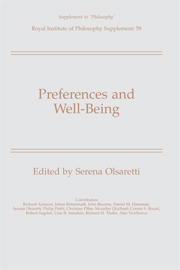Book contents
- Frontmatter
- Contents
- List of Contributors
- “Introduction”
- “Desire Formation and Human Good”
- “Preference Formation and Personal Good”
- “Leading a Life of One's Own: On Well-Being and Narrative Autonomy”
- “Well-Being, Adaptation and Human Limitations”
- “Consequentialism and Preference Formation in Economics and Game Theory”
- “Preferences, Deliberation and Satisfaction”
- “Content-Related and Attitude-Related Reasons for Preferences”
- “Reasoning with Preferences?”
- “Taking Unconsidered Preferences Seriously”
- “Preferences, Paternalism, and Liberty”
- “Preference Change and Interpersonal Comparisons of Welfare”
“Leading a Life of One's Own: On Well-Being and Narrative Autonomy”
Published online by Cambridge University Press: 07 May 2010
- Frontmatter
- Contents
- List of Contributors
- “Introduction”
- “Desire Formation and Human Good”
- “Preference Formation and Personal Good”
- “Leading a Life of One's Own: On Well-Being and Narrative Autonomy”
- “Well-Being, Adaptation and Human Limitations”
- “Consequentialism and Preference Formation in Economics and Game Theory”
- “Preferences, Deliberation and Satisfaction”
- “Content-Related and Attitude-Related Reasons for Preferences”
- “Reasoning with Preferences?”
- “Taking Unconsidered Preferences Seriously”
- “Preferences, Paternalism, and Liberty”
- “Preference Change and Interpersonal Comparisons of Welfare”
Summary
We all want things. And although we might disagree on just how significant our wants, desires, or preferences are for the matter of how well we fare in life, we would probably all agree on some of them having some significance. So any reasonable theory about the human good should in some way acknowledge this. The theory that most clearly meets this demand is of course preferentialism, but even pluralist theories can do so. However, then they will at the same time bring aboard a classical problem for preferentialism, namely that of discriminating among preferences. Not all preferences would seem to make contributions to our well-being and there should be some set of criteria which at least makes it intelligible why there is such a difference and that perhaps can even be used in order to evaluate hard cases.
In what follows here I will start with a brief overview of the kind of approach to the human good that I find most reasonable, namely a holistic one, and I will then go on to discuss how one should, given such an approach, discriminate between different preferences. I will start by explicating why some preferences might, because they have the wrong kind of structure, never contribute to our well-being and I will then go on to account for how even among those that can, many preferences still have this capacity lessened because of an impaired autonomy in the holder of them.
- Type
- Chapter
- Information
- Preferences and Well-Being , pp. 65 - 82Publisher: Cambridge University PressPrint publication year: 2006
- 3
- Cited by



